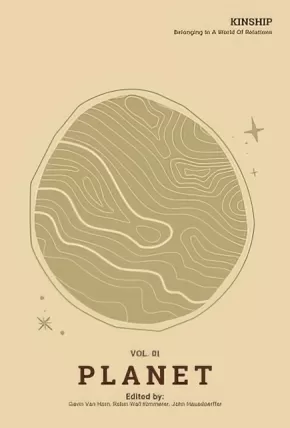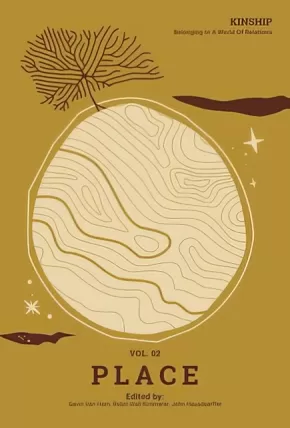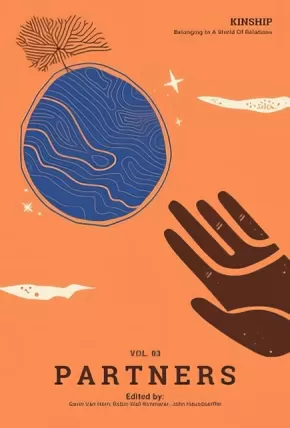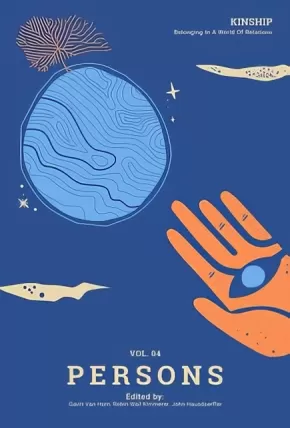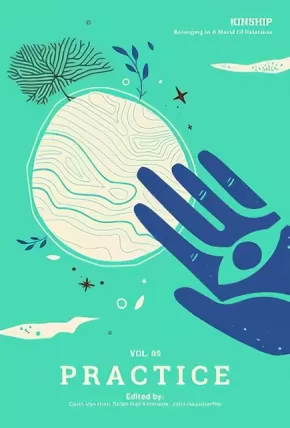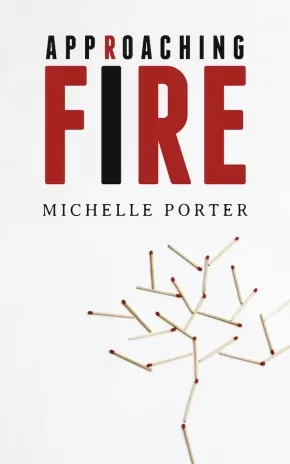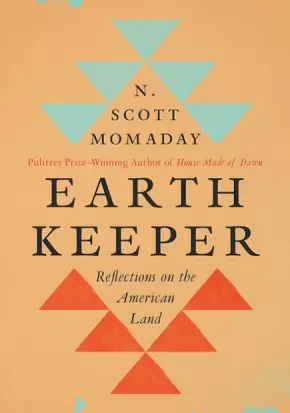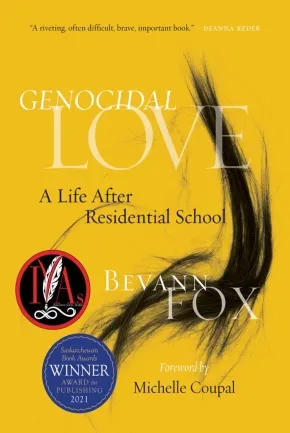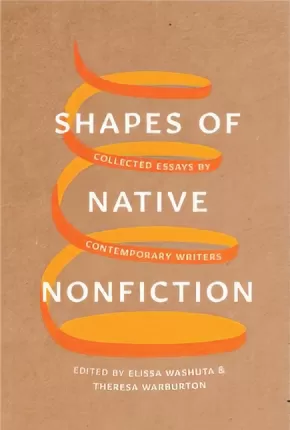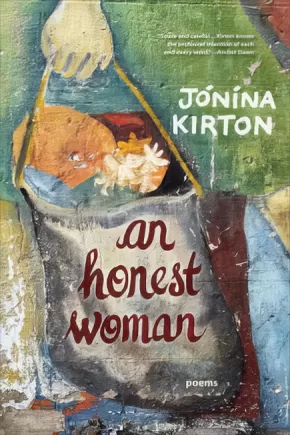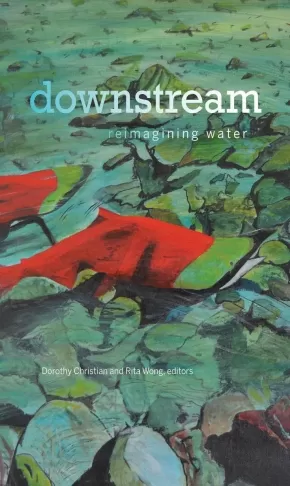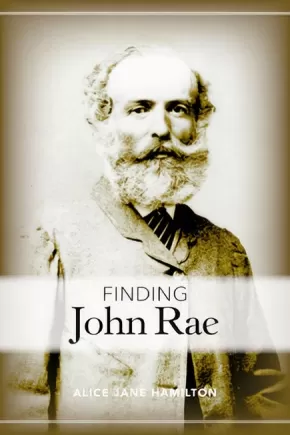Creative Non-fiction
Synopsis:
We live in an astounding world of relations. We share these ties that bind with our fellow humans—and we share these relations with nonhuman beings as well. From the bacterium swimming in your belly to the trees exhaling the breath you breathe, this community of life is our kin—and, for many cultures around the world, being human is based upon this extended sense of kinship.
Kinship: Belonging in a World of Relations is a lively series that explores our deep interconnections with the living world. The five Kinship volumes—Planet, Place, Partners, Persons, Practice—offer essays, interviews, poetry, and stories of solidarity, highlighting the interdependence that exists between humans and nonhuman beings. More than 70 contributors—including Robin Wall Kimmerer, Richard Powers, David Abram, J. Drew Lanham, and Sharon Blackie—invite readers into cosmologies, narratives, and everyday interactions that embrace a more-than-human world as worthy of our response and responsibility.
With every breath, every sip of water, every meal, we are reminded that our lives are inseparable from the life of the world—and the cosmos—in ways both material and spiritual. “Planet,” Volume 1 of the Kinship series, focuses on our Earthen home and the cosmos within which our “pale blue dot” of a planet nestles. National poet laureate Joy Harjo opens up the volume asking us to “Remember the sky you were born under.” The essayists and poets that follow—such as geologist Marcia Bjornerud who takes readers on a Deep Time journey, geophilosopher David Abram who imagines the Earth’s breathing through animal migrations, and theoretical physicist Marcelo Gleiser who contemplates the relations between mystery and science—offer perspectives from around the world and from various cultures about what it means to be an Earthling, and all that we share in common with our planetary kin. “Remember,” Harjo implores, “all is in motion, is growing, is you.”
Proceeds from sales of Kinship benefit the nonprofit, non-partisan Center for Humans and Nature, which partners with some of the brightest minds to explore human responsibilities to each other and the more-than-human world. The Center brings together philosophers, ecologists, artists, political scientists, anthropologists, poets and economists, among others, to think creatively about a resilient future for the whole community of life.
Contributors are both Indigenous and non-Indigenous.
Additional Information
180 pages | 5.27" x 7.75" | Paperback
Synopsis:
We live in an astounding world of relations. We share these ties that bind with our fellow humans—and we share these relations with nonhuman beings as well. From the bacterium swimming in your belly to the trees exhaling the breath you breathe, this community of life is our kin—and, for many cultures around the world, being human is based upon this extended sense of kinship.
Kinship: Belonging in a World of Relations is a lively series that explores our deep interconnections with the living world. The five Kinship volumes—Planet, Place, Partners, Persons, Practice—offer essays, interviews, poetry, and stories of solidarity, highlighting the interdependence that exists between humans and nonhuman beings. More than 70 contributors—including Robin Wall Kimmerer, Richard Powers, David Abram, J. Drew Lanham, and Sharon Blackie—invite readers into cosmologies, narratives, and everyday interactions that embrace a more-than-human world as worthy of our response and responsibility.
Given the place-based circumstances of human evolution and culture, global consciousness may be too broad a scale of care. “Place,” Volume 2 of the Kinship series, addresses the bioregional, multispecies communities and landscapes within which we dwell. The essayists and poets in this volume take us around the world to a variety of distinctive places—from ethnobiologist Gary Paul Nabhan’s beloved and beleaguered sacred U.S.-Mexico borderlands, to Pacific islander and poet Craig Santos Perez’s ancestral shores, to writer Lisa María Madera’s “vibrant flow of kinship” in the equatorial Andes expressed in Pacha Mama’s constitutional rights in Ecuador. As Chippewa scholar-activist Melissa Nelson observes about kinning with place in her conversation with John Hausdoerffer: “Whether a desert mesa, a forested mountain, a windswept plain, or a crowded city—those places also participate in this serious play with raven cries, northern winds, car traffic, or coyote howls.” This volume reveals the ways in which playing in, tending to, and caring for place wraps us into a world of kinship.
Proceeds from sales of Kinship benefit the nonprofit, non-partisan Center for Humans and Nature, which partners with some of the brightest minds to explore human responsibilities to each other and the more-than-human world. The Center brings together philosophers, ecologists, artists, political scientists, anthropologists, poets and economists, among others, to think creatively about a resilient future for the whole community of life.
Contributors are both Indigenous and non-Indigenous.
Additional Information
204 pages | 5.27" x 7.75" | Paperback
Synopsis:
We live in an astounding world of relations. We share these ties that bind with our fellow humans—and we share these relations with nonhuman beings as well. From the bacterium swimming in your belly to the trees exhaling the breath you breathe, this community of life is our kin—and, for many cultures around the world, being human is based upon this extended sense of kinship.
Kinship: Belonging in a World of Relations is a lively series that explores our deep interconnections with the living world. The five Kinship volumes—Planet, Place, Partners, Persons, Practice—offer essays, interviews, poetry, and stories of solidarity, highlighting the interdependence that exists between humans and nonhuman beings. More than 70 contributors—including Robin Wall Kimmerer, Richard Powers, David Abram, J. Drew Lanham, and Sharon Blackie—invite readers into cosmologies, narratives, and everyday interactions that embrace a more-than-human world as worthy of our response and responsibility.
How do cultural traditions, narratives, and mythologies shape the ways we relate, or not, to other beings as kin? “Partners,” Volume 3 of the Kinship series, looks to the intimate relationships of respect and reverence we share with nonhuman species. The essayists and poets in this volume explore the stunning diversity of our relations to nonhuman persons—from biologist Merlin Sheldrake’s reflections on microscopic fungal networks, to writer Julian Hoffman’s moving stories about elephant emotions and communication, to Indigenous seed activist Rowen White’s deep care for plant relatives and ancestors. Our relationships to other creatures are not merely important; they make us possible. As poet Brenda Cárdenas, inspired by her cultural connections to the monarch butterfly, notes in this volume: “We are— / one life passing through the prism / of all others, gathering color and song.”
Proceeds from sales of Kinship benefit the nonprofit, non-partisan Center for Humans and Nature, which partners with some of the brightest minds to explore human responsibilities to each other and the more-than-human world. The Center brings together philosophers, ecologists, artists, political scientists, anthropologists, poets and economists, among others, to think creatively about a resilient future for the whole community of life.
Contributors are both Indigenous and non-Indigenous.
Additional Information
170 pages | 5.27" x 7.75" | Paperback
Synopsis:
We live in an astounding world of relations. We share these ties that bind with our fellow humans—and we share these relations with nonhuman beings as well. From the bacterium swimming in your belly to the trees exhaling the breath you breathe, this community of life is our kin—and, for many cultures around the world, being human is based upon this extended sense of kinship.
Kinship: Belonging in a World of Relations is a lively series that explores our deep interconnections with the living world. The five Kinship volumes—Planet, Place, Partners, Persons, Practice—offer essays, interviews, poetry, and stories of solidarity, highlighting the interdependence that exists between humans and nonhuman beings. More than 70 contributors—including Robin Wall Kimmerer, Richard Powers, David Abram, J. Drew Lanham, and Sharon Blackie—invite readers into cosmologies, narratives, and everyday interactions that embrace a more-than-human world as worthy of our response and responsibility.
Kinship spans the cosmos, but it is perhaps most life-changing when experienced directly and personally. “Persons,” Volume 4 of the Kinship series, attends to the personal—our unique experiences with particular creatures and landscapes. This includes nonhuman kin that become our allies, familiars, and teachers as we navigate a “world as full of persons, human and otherwise, all more-or-less close kin, all deserving respect,” as religious studies scholar Graham Harvey puts it. The essayists and poets in the volume share a wide variety of kinship-based experiences—from Australian ecophilosopher Freya Mathews’s perspective on climate-related devastation on her country’s koalas, to English professor and forest therapy guide Kimberly Ruffin’s reclamation of her “inner animal,” to German biologist and philosopher Andreas Weber’s absorption with and by lichen. Our kinships are interpersonal, and being “pried open with curiosity,” as poet and hip-hop emcee Manon Voice notes in this volume, “Stir the first of many magicks.”
Proceeds from sales of Kinship benefit the nonprofit, non-partisan Center for Humans and Nature, which partners with some of the brightest minds to explore human responsibilities to each other and the more-than-human world. The Center brings together philosophers, ecologists, artists, political scientists, anthropologists, poets and economists, among others, to think creatively about a resilient future for the whole community of life.
One of the editors of this work is Indigenous. And, throughout the series, various Indigenous contributions (stories, poems, etc.) can be found.
Additional Information
194 pages | 5.27" x 7.75" | Paperback
Synopsis:
We live in an astounding world of relations. We share these ties that bind with our fellow humans—and we share these relations with nonhuman beings as well. From the bacterium swimming in your belly to the trees exhaling the breath you breathe, this community of life is our kin—and, for many cultures around the world, being human is based upon this extended sense of kinship.
Kinship: Belonging in a World of Relations is a lively series that explores our deep interconnections with the living world. These five Kinship volumes—Planet, Place, Partners, Persons, Practice—offer essays, interviews, poetry, and stories of solidarity, highlighting the interdependence that exists between humans and nonhuman beings. More than 70 contributors—including Robin Wall Kimmerer, Richard Powers, David Abram, J. Drew Lanham, and Sharon Blackie—invite readers into cosmologies, narratives, and everyday interactions that embrace a more-than-human world as worthy of our response and responsibility. These diverse voices render a wide range of possibilities for becoming better kin.
From the perspective of kinship as a recognition of nonhuman personhood, of kincentric ethics, and of kinship as a verb involving active and ongoing participation, how are we to live? “Practice,” Volume 5 of the Kinship series, turns to the relations that we nurture and cultivate as part of our lived ethics. The essayists and poets in this volume explore how we make kin and strengthen kin relationships through respectful participation—from creative writer and dance teacher Maya Ward’s weave of landscape, story, song, and body, to Lakota peace activist Tiokasin Ghosthorse’s reflections on language as a key way of knowing and practicing kinship, to cultural geographer Amba Sepie’s wrestling with how to become kin when ancestral connections have frayed. The volume concludes with an amazing and spirited conversation between John Hausdoerffer, Robin Wall Kimmerer, Sharon Blackie, Enrique Salmon, Orrin Williams, and Maria Isabel Morales on the breadth and qualities of kinship practices.
Proceeds from sales of Kinship benefit the nonprofit, non-partisan Center for Humans and Nature, which partners with some of the brightest minds to explore human responsibilities to each other and the more-than-human world. The Center brings together philosophers, ecologists, artists, political scientists, anthropologists, poets and economists, among others, to think creatively about a resilient future for the whole community of life.
Contributors are both Indigenous and non-Indigenous.
Additional Information
194 pages | 5.27" x 7.75" | Paperback
Synopsis:
First Nations, Métis and Inuit artists, activists, educators and writers, youth and elders come together to envision Indigenous futures in Canada and around the world.
Discussing everything from language renewal to sci-fi, this collection is a powerful and important expression of imagination rooted in social critique, cultural experience, traditional knowledge, activism and the multifaceted experiences of Indigenous people on Turtle Island.
In Me Tomorrow:
Darrel J. McLeod, Cree author from Treaty-8 territory in Northern Alberta, blends the four elements of the Indigenous cosmovision with the four directions of the medicine wheel to create a prayer for the power, strength and resilience of Indigenous peoples.
Autumn Peltier, Anishinaabe water-rights activist, tells the origin story of her present and future career in advocacy—and how the nine months she spent in her mother’s womb formed her first water teaching. When the water breaks, like snow melting in the spring, new life comes.
Lee Maracle, acclaimed Stó:lō Nation author and educator, reflects on cultural revival—imagining a future a century from now in which Indigenous people are more united than ever before.
Other essayists include Cyndy and Makwa Baskin, Norma Dunning, Shalan Joudry, Shelley Knott-Fife, Tracie Léost, Stephanie Peltier, Romeo Saganash, Drew Hayden Taylor and Raymond Yakeleya.
For readers who want to imagine the future, and to cultivate a better one, Me Tomorrow is a journey through the visions generously offered by a diverse group of Indigenous thinkers.
Additional Information
224 pages | 5.50" x 8.50" | Paperback
Synopsis:
In Approaching Fire, Michelle Porter embarks on a quest to find her great-grandfather, the Métis fiddler and performer Léon Robert Goulet. Through musicology, jigs and reels, poetry, photographs, and the ecology of fire, Porter invests biography with the power of reflective ingenuity, creating a portrait which expands beyond documentation into a private realm where truth meets metaphor.
Weaving through multiple genres and traditions, Approaching Fire fashions a textual documentary of rescue and insight, and a glowing contemplation of the ways in which loss can generate unbridled renewal.
Awards
- The Miramichi Reader's 2020 Most Promising Author Award
Reviews
“I wanted to write in a magical and poetic voice, but more than that I wanted to read magical books - true and straight up poetic stories that fulfill the past. Michelle is such a writer. This book is the art Louis spoke of that begins a much needed conversation: Métis nation or Manitoba?” - Lee Maracle
“I've never read a book quite like this before… Approaching Fire is a documentary you can hold in your hands, in which, rather than being a passive witness to scenes unfolding, you become immersed in a river of poetry. Author Michelle Porter uses a mixture of genres to create an account of her journey to uncover the history of her Métis roots, stretching from Newfoundland to British Columbia, Alberta to Saskatchewan, and finally digging deeply into Manitoba. Michelle travels through the stories she was raised on, using them as a base from which to understand the accounts of others, learning all she can about her Great Great Grandfather, Léon Robert (Bob) Goulet, renowned fiddler and performer. Her Pépé. In his story, her story, a wider history of the Métis people is told. A history of racial discrimination, stolen land rights, and the question of what truly unites and defines Métis identity. This book blazes with poetic beauty, and a voice Canada needs to hear.”— More Books Than Days
Additional Information
192 pages | 5.25" x 8.25" | Paperback
Synopsis:
A magnificent testament to the earth, from Pulitzer Prize-winning novelist and poet N. Scott Momaday.
One of the most distinguished voices in American letters, N. Scott Momaday has devoted much of his life to celebrating and preserving Native American culture, especially its oral tradition. A member of the Kiowa tribe who was born and grew up on Indian reservations throughout the Southwest, Momaday has an intimate connection to the land he knows well and loves deeply.
In Earth Keeper: Reflections on the American Land, he reflects on his native ground and its influence on his people. “When I think about my life and the lives of my ancestors, I am inevitably led to the conviction that I, and they, belong to the American land. This is a declaration of belonging. And it is an offering to the earth.” he writes.
Momaday recalls stories of his childhood, stories that have been passed down through generations, stories that reveal a profound and sacred connection to the American landscape and a reverence for the natural world.
In this moving and lyrical work, he offers an homage and a warning. Momaday reminds us that the Earth is a sacred place of wonder and beauty; a source of strength and healing that must be protected before it’s too late. As he so eloquently yet simply expresses, we must all be keepers of the Earth.
Reviews
“Poets and storytellers have always reminded us of our spiritual connections to the land and the world around us — passed along through dreams, stories, memories, and mythologies. Scott Momaday skillfully continues this tradition in Earth Keeper, from which we can all learn and benefit.”— Robert Redford
“Earth Keeper is a prayer for continuity in these days of uncertainty. I cannot tell you why I loved this book, I can only tell you I wept my way through it. Each page brought me closer to myself, a self I had lost in the pandemic. We need Scott Momaday's calm, clear prose and stories. Words are medicine. There is wisdom in sharing what one knows, especially at a time when we know so little. ‘Let me say my heart,’ he says. And he does.”— Terry Tempest Williams, author of Erosion: Essays of Undoing
"Dazzling. . . . In glittering prose, Momaday recalls stories passed down through generations, illuminating the earth as a sacrosanct place of wonder and abundance. At once a celebration and a warning, Earth Keeper is an impassioned defense of all that our endangered planet stands to lose."— Esquire
“Wonder abounds in these pages. . . . Short chapters of prose that read almost like prayers to the natural world.”— Kirkus Reviews
“Short but satisfying. . . . Using lyrical, heartfelt language, [Momaday] looks back on a life lived close to nature, and on the joy that natural wonders have given him. . . . At a time when bad news is in plentiful supply, readers will find Momaday’s words refreshing and comforting in their sincerity.”— Publishers Weekly
"A profound reflection on humanity's relationship with its terrestrial home, the planet Earth."— Booklist
“A collection of short essays as multilayered and majestic as the landscape that has been present in everything that Momaday has written. . . . [A] poetic love letter to the Earth.”— Minneapolis Star Tribune
Educator Information
From the Author's Note: "This book is a very personal account, a kind of spiritual autobiography."
Additional Information
80 pages | 5.00" x 7.12"
Synopsis:
How can we heal in the face of trauma? How can we transform intergenerational pain into a passion for community and healing?
Presenting herself as “Myrtle,” residential school survivor and Indigenous television personality Bevann Fox explores essential questions by recounting her life through fiction. She shares memories of an early childhood filled with love with her grandparents—until she is sent to residential school at the age of seven. Her horrific experiences of abuse there left her without a voice, timid and nervous, never sure, never trusting, affecting her romantic relationships and family bonds for years to come.
This is the story of Myrtle battling to recover her voice. Genocidal Love is a powerful confirmation of the long-lasting consequences of residential school violence —and a moving story of finding a path towards healing.
Awards
- 2021 Indigenous Voices Awards winner for Published Prose in English: Creative Nonfiction and Life-Writing
Reviews
“A riveting, often difficult, brave, important book. ” —Deanna Reder, Chair, Department of Indigenous Studies, Simon Fraser University
“A riveting and courageous reflection. . . . Genocidal Love is unique in its detailed account of the often re-traumatizing effects of the legal and bureaucratic barriers of compensation programs predating the Truth and Reconciliation Commission. ” —Jesse Rae Archibald-Barber, editor of kisiskâciwan and co-editor of Performing Turtle Island
“Fox tears beauty from the jaws of genocide, daring to claim love beyond settler imaginings—love that nurtures decolonial futures and makes possible a more just world. ”—Sam McKegney, author of Magic Weapons and Masculindians
Educator Information
A forward from Michelle Coupal explains more about "Genocidal Love—a story that Bevann tells about herself outside the boundaries of what constitutes fiction and non-fiction".
Additional Information
256 pages | 5.00" x 7.00"
Synopsis:
Just as a basket’s purpose determines its materials, weave, and shape, so too is the purpose of the essay related to its material, weave, and shape. Editors Elissa Washuta and Theresa Warburton ground this anthology of essays by Native writers in the formal art of basket weaving. Using weaving techniques such as coiling and plaiting as organizing themes, the editors have curated an exciting collection of imaginative, world-making lyric essays by twenty-seven contemporary Native writers from tribal nations across Turtle Island into a well-crafted basket.
Shapes of Native Nonfiction features a dynamic combination of established and emerging Native writers, including Stephen Graham Jones, Deborah Miranda, Terese Marie Mailhot, Billy-Ray Belcourt, Eden Robinson, and Kim TallBear. Their ambitious, creative, and visionary work with genre and form demonstrate the slippery, shape-changing possibilities of Native stories. Considered together, they offer responses to broader questions of materiality, orality, spatiality, and temporality that continue to animate the study and practice of distinct Native literary traditions in North America.
Reviews
"In this anthology, shape matters. It turns the essay into a resistant form, pushing against the myth of the ‘disappearing Native’ and asserting a new narrative, one that isn’t subject to colonizing. . . . Shapes of Native Nonfiction is full of cognitive and emotional work. It turns the essay into something alive and breathing." - Cincinnati Review
"The medium is the message in this formally daring anthology of essays from Native writers, organized into basket-weaving themes such as ‘coiling’ and ‘plaiting.’ In these 27 essays by writers hailing from multiple tribal nations, some established and some newcomers, the Native experience is interrogated, elucidated, and celebrated." - Esquire
"In gathering contemporary Native nonfiction, this book elucidates the roots of the form-conscious essay and brings together the exciting current work of Native writers. In a sweeping decolonizing gesture, this anthology challenges the nonfiction canon as it’s been taught and creates a porous new space in its place." - Essay Daily
"Shapes of Native Nonfiction is. . . an accessible, engaging book, both for those who have read widely on the subject and for those seeking a place to begin." - New York Journal of Books
"This new collection of essays from established and emerging contemporary Indigenous writers is stunning both in-depth and scope. . . . The collection, expertly curated and structured by writer and Cowlitz Indian Tribe member Elissa Washuta (whose incredible essay Apocalypse Logic also appears here) and literary scholar Theresa Warburton, shines in every piece and in its existence as a whole. . . . In these pages, storytelling is a way of developing new Native nonfiction literary possibility." - Literary Hub
"Shapes of Native Nonfiction introduces the reader to a unique collection of voices, telling stories that shift from lost to living language, from history to lived experience. These shifts create new shapes for Indigenous writers to inhabit, explore and share. In this anthology, that shaping makes for a powerful read, and an absolutely necessary one" - High Country News
"In this far-ranging collection of essays, Indigenous writers explore family, home, landscape, identity, trauma, history, and memory. Some of the essays are about writing itself. Others tell stories about particular experiences or moments. Still others are more outwardly focused, exploring art, culture, and politics. Part of what makes this book so unique is the various innovative forms the essays take." - Book Riot
Additional Information
302 pages | 6.00" x 9.00" | Paperback
Synopsis:
I open my eyes in the darkness, laying on my side, half my vision is of the earth and shadows; the other is of the sky, treetops, and stars. I should write Clifford’s story. The thought emerges fully formed . . . The thought dissipates. I close my eyes and the earth and the sky disappear. The warmth of my sleeping bag wraps around me and sleep pulls me under into that half-world where reality and fantasy mingle in a place where coherent thoughts disintegrate.
When Harold Johnson returns to his childhood home in a northern Saskatchewan Indigenous community for his brother Clifford’s funeral, the first thing his eyes fall on is a chair. It stands on three legs, the fourth broken off and missing. So begins a journey through the past, a retrieval of recollections that have too long sat dormant. Moving from the old family home to the log cabin, the garden, and finally settling deep in the forest surrounding the property, his mind circles back, shifting in time and space, weaving in and out of memories of his silent, powerful Swedish father; his formidable Cree mother, an expert trapper and a source of great strength; and his brother Clifford, a precocious young boy who is drawn to the mysterious workings of the universe.
As the night unfolds, memories of Clifford surface in Harold’s mind’s eye: teaching his younger brother how to tie his shoelaces; jousting on a bicycle without rubber wheels; building a motorcycle. Memory, fiction, and fantasy collide, and Clifford comes to life as the scientist he was meant to be, culminating in his discovery of the Grand Unified Theory.
Exquisitely crafted, funny, visionary, and wholly moving, Clifford is an extraordinary work for the way it defies strict category and embraces myriad forms of storytelling. To read it is to be immersed in a home, a family, a community, the wider world, the entire cosmos.
Reviews
“Clifford is a luminous, genre-bending memoir. Heartache and hardship are no match for the disarming whimsy, the layered storytelling shot through with love. The power of land, the pull of family, the turbulence of poverty are threads woven together with explorations of reality, tackling truth with a trickster slant.” — Eden Robinson, author of Son of a Trickster
“Clifford is a story only Harold Johnson could tell. By turns soft and harsh, intellectual and emotional, Johnson weaves truth, fiction, science, and science fiction into a tapestry that is rich with meaning and maybes. A natural storyteller, Johnson seeks imagined pasts and futurity with equal parts longing and care. This work allows readers and writers the possibility of new and ancient modes of storytelling.” — Tracey Lindberg, author of Birdie
“Harold R. Johnson is a wonderful writer, and Clifford is his best work yet. For fans of Jack Finney and Richard Matheson, this terrific book is a wonderfully human tale of memory both bitter and sweet, as well as a poignant exploration of time’s hold over all of us.” — Robert J. Sawyer, Hugo Award–winning author of Quantum Night
“Clifford is unlike anything I’ve read — it is at once a story of science and magic, love and loss, and a case for the infinite potential of humanity. It is a book of profound wisdom — an unpacking of the deepest truths of science in an effort to transform the pain of grief and regret into healing and forgiveness.” — Patti Laboucane-Benson, author of The Outside Circle
Educator Information
Curriculum Connections: English, Biographies, Family
Additional Information
264 pages | 5.25" x 8.00"
Synopsis:
Otter’s Journey employs the Anishinaabe tradition of storytelling to explore how Indigenous language revitalization can inform the emerging field of Indigenous legal revitalization. Indigenous languages and laws need bodies to live in. Learning an endangered language and a suppressed legal system are similar experiences. When we bring language back to life, it becomes a medium for developing human relationships. Likewise, when laws are written on people’s hearts, true revitalization has occurred.
Storytelling has the capacity to address feelings and demonstrate themes – to illuminate beyond argument and theoretical exposition. In Otter’s Journey, Lindsay Keegitah Borrows follows Otter, a dodem (clan) relation from the Chippewas of Nawash First Nation, on a journey across Anishinaabe, Inuit, Māori, Coast Salish, and Abenaki territories, through a narrative of Indigenous resurgence. While Otter’s Journey is guided by a literal truth, it also splices and recombines real-world events and characters.
Through her engaging protagonist, Borrows reveals that the processes, philosophies, and practices flowing from Indigenous languages and laws can emerge from under the layers of colonial laws, policies, and languages to become guiding principles in people’s contemporary lives. We need the best of all people’s teachings to lead us into the future.
Students and scholars in a wide range of subfields within Indigenous studies will find this book of considerable appeal, as will scholars and students of law, literature, education, and language studies, and those with an interest in Indigenous methodologies.
Reviews
"Otter’s Journey holds the potential to change the way people think about and, in turn, talk about Indigenous laws and Indigenous language acquisition and reacquisition ... The elemental way in which legal storytelling is embedded in the text makes Indigenous laws and language normative, not as things to be justified or even accommodated. Eloquent, poetic, and lyrical, this book marks a rare and even generational shift in the dialogue by and about Indigenous peoples." - Tracey Lindberg, author of Birdie, and professor of law and University Research Chair in Indigenous Laws, Legal Orders and Traditions at the University of Ottawa
"Otter's Journey offers a vibrant account of the possibilities and importance of Indigenous language revitalization. Weaving oral narrative, prose fiction, and autobiography, Lindsay Borrows models a scholarly practice grounded in family, community, and storytelling. This is an important academic contribution – and also a new work of Indigenous literature by an emerging writer of considerable skill." - Keavy Martin, author of Stories in a New Skin: Approaches to Inuit Literature, and associate professor in the Department of English and Film Studies at the University of Alberta
Additional Information
236 pages | 6.00" x 9.00"
Synopsis:
An Honest Woman by Jonina Kirton confronts us with beauty and ugliness in the wholesome riot that is sex, love, and marriage. From the perspective of a mixed-race woman, Kirton engages with Simone de Beauvoir and Donald Trump to unravel the norms of femininity and sexuality that continue to adhere today.
Kirton recalls her own upbringing, during which she was told to find a good husband who would “make an honest woman” out of her. Exploring the lives of many women, including her mother, her contemporaries, and well-known sex-crime stories such as the case of Elisabeth Fritzl, Kirton mines the personal to loosen the grip of patriarchal and colonial impositions.
An Honest Woman explores the many ways the female body is shaped by questions that have been too political to ask: What happens when a woman decides to take her sexuality into her own hands, dismissing cultural norms and the expectations of her parents? How is a young woman’s sexuality influenced when she is perceived as an “exotic” other? Can a woman reconnect with her Indigenous community by choosing Indigenous lovers?
Daring and tender in their honesty and wisdom, these poems challenge the perception of women’s bodies as glamorous and marketable commodities and imagine an embodied female experience that accommodates the role of creativity and a nurturing relationship with the land.
Reviews
“Jonina Kirton is courageously honest about her life experiences as a female of Indigenous and immigrant ancestry. Many poems resonate deeply, as we identify with her personal quest to figure out who she is, and the unacceptable things done to her. Her raw honesty is unsettling and uncomfortable, because it can be our truth too. Her poems depict devaluation and dehumanization, grieving, lessons learned. Her poems offer important insights as to why there are thousands of missing and murdered Indigenous women.” — Senator Lillian E. Dyck
“When writing from the voice of between, writer and reader have no place to hide. Assumptions and camouflage fall away. Murdered, missing, and violated women and girl voices have been silenced. The story lethally repeats. Kirton picks over how she was raised familially and culturally like a crime scene. Too, she affirms, ‘I have been here forever and I will rise again and again.’ Tough, eloquent, revelatory, these poems are the very ones we are desperately in need of.” — Betsy Warland, author of Oscar of Between: A Memoir of Identity and Ideas
“I’m sure people have been looking at me strangely every time I gasp, but I can’t glance away from the page for even a second to notice. Some of the poems end sharply, with a punch; some deliberately leave me searching for the next line; others show the repetition of heartbreaking cycles of violence and oppression, but offer a portrayal of resilience, too.” — All Lit Up!
Educator Information
This book would be useful for Women's Studies, Creative Writing, English Language Arts, Poetry, and English courses. Recommended for grades 11-12 and university-college students.
Please be advised, this book contains explicit sexual references and references to sexual and physical abuse.
Additional Information
104 pages | 6.00" x 9.00"
Synopsis:
downstream: reimagining water brings together artists, writers, scientists, scholars, environmentalists, and activists who understand that our shared human need for clean water is crucial to building peace and good relationships with one another and the planet. This book explores the key roles that culture, arts, and the humanities play in supporting healthy water-based ecology and provides local, global, and Indigenous perspectives on water that help to guide our societies in a time of global warming. The contributions range from practical to visionary, and each of the four sections closes with a poem to encourage personal freedom along with collective care.
This book contributes to the formation of an intergenerational, culturally inclusive, participatory water ethic. Such an ethic arises from intellectual courage, spiritual responsibilities, practical knowledge, and deep appreciation for human dependence on water for a meaningful quality of life. downstream illuminates how water teaches us interdependence with other humans and living creatures, both near and far.
Reviews
"Downstream stakes out a bold and creative claim to collaborative and cross-cultural eco-spiritual-neo-traditional knowing and, with it, new approaches to policy and action. A timely read that lends depth and resonance to some of the material and voices [in other books on the subject]." — Heather Menzies, Literary Review of Canada, June 2017
"This rich collection brings together the work of artists, writers, scientists, scholars, environmentalists, and activists, all focusing on the looming global water crisis. ... Writing styles vary from piece to piece throughout the book—poetic, personal, journalistic, and academic—but the shifts between each are well worth navigating for any reader interested in human futures on Earth."— Publishers Weekly, August 2017
"This collection of works successfully expands our knowledge of and experience with water by merging natural science, social science, arts, and humanities approaches to water. It offers new, innovative, and engaging ways to think about and experience water, especially as it relates to life and vitality."— Sara Beth Keough, American Review of Canadian Studies, November -0001
Educator Information
This collection of essays is useful for these course/subject areas or topics: Language Arts & Disciplines; Creative Writing; Indigenous Studies; Poetry; Environmental Studies; Environmental Humanities.
Table of Contents
Introduction: Re-storying Waters, Re-storying Relations / Rita Wong and Dorothy Christian
Part I: Contexts for Knowing and Unknowing Water
1. Planetary Distress Signals / Alanna Mitchell
2. Water / Lee Maracle
3. Interweaving Water: The Incremental Transformation of Sovereign Knowledge into Collaborative Knowledge / Michael D. Blackstock
4. Water and Knowledge / Astrida Neimanis
5. Excerpts from “a child’s fable” / Baco Ohama
Part II: Water Testimonies: Witness, Worry, and Work
6. Water: The First Foundation of Life / Mona Polacca
7. From Our Homelands to the Tar Sands / Melina Laboucan Massimo
8. Keepers of the Water: Nishnaabe-kwewag Speaking for the Water / Renee Elizabeth Mzinegiizhigo-kwe Bedard
9. Water Walk Pedagogy / Violet Caibaiosai
10. A Response to Pascua Lama / Cecilia Vicuna
Part III: Shared Ethical and Embodied Practices
11. Moving with Water: Relationship and Responsibilities / Alannah Young Leon and Denise Marie Nadeau
12. Bodies of Water: Meaning in Movement / Seonagh Odhiambo Horne
13. Upstream: A Conversation with Water / Cathy Stubington
14. Ice Receding, Books Reseeding / Basia Irland
15. Tsunami Chant / Wang Ping
Part IV: A Respectful Co-existence in Common: Water Perspectives
16. Listening to the Elders at the Keepers of the Water Gathering /Radha D’Souza
17. Coastal Waters in Distress from Excessive Nutrients / Paul J. Harrison
18. Bodies of Water: Asian Canadians In/Action with Water /Janey Lew
19. Permeable Toronto: A Hydro-Eutopia / Janine MacLeod
20. Saturate/Dissolve: Water for Itself, Un-Settler Responsibilities, and Radical Humility / Larissa Lai
21. Bring Me Back / Janet Rogers
Additional Information
300 pages | 6.00" x 9.00"
Synopsis:
John Rae was known as the “Arctic Fox” for his ability to trek vast distances in a short time across the Arctic. This creative nonfiction biography of the celebrated Arctic explorer begins in 1854 when, on a mapping expedition to the Boothia Peninsula, Rae discovers the missing link in the Northwest Passage and the fate of the missing Franklin Expedition — learning from Inuit hunters that Franklin’s ships had been beset by ice, and that the crew, starving in the cold, had resorted to cannibalism. When the Scottish-born scientist and Hudson’s Bay Company Chief Factor reports the details in private to the British Admiralty, his statement is secretly but deliberately released to the newspapers. Led by such well-known figures as Charles Dickens and Sir John Franklin’s widow, much of the population rises against Rae and his Inuit informants. Alice Jane Hamilton goes on to explore how Rae, through bitter disappointment and soaring hope, rebuilds his life, all the while defending the integrity of the Arctic natives who brought him the evidence of cannibalism.
Reviews
"Alice Jane Hamilton skilfully blends fact and fiction to breathe new life into the thrilling story of John Rae, the most successful, and yet least celebrated, Arctic explorer of the 19th century. " — Tom Muir, author of Orkney Folk Tales
“Finding John Rae brings one of the greatest, and most under-appreciated, 19th-century Arctic explorers vividly to life.” — John Wilson, author of Discovering the Arctic
Additional Information
228 pages | 9.00" x 6.00"
This book is creative nonfiction, a genre of writing that presents factually accurate narratives using literary style and technique (creativity).

